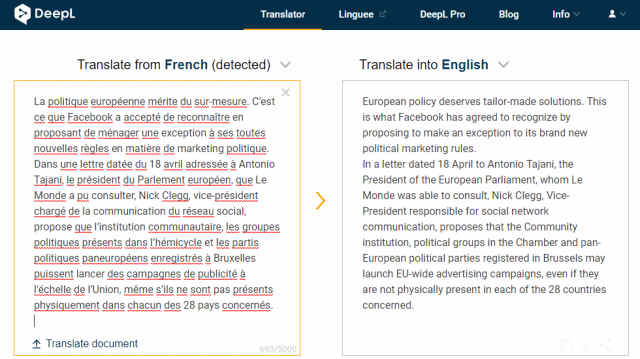
Writers, readers, travelers, and anyone who wants to understand a document or a piece of text written in foreign language can access an online tool that produces a rough translation for tens of languages. The go-to tool for many people is Google Translator, but there is a new service that produces better results, and understands the importance of privacy, too: it is called DeepL.
Deepl doesn’t come completely out of thin air, but its developers have a long history with Linguee that has been a widely used online translator for years. Now, the modern DeepL Translator applies neural machine and artificial intelligence technologies to produce translations. And it seems to be working.
DeepL conducted a blind test of translations for 100 foreign language sentences. The sentences were translated by DeepL Translator, Google Translate, Microsoft Translator, and Facebook. Professional translators assessed the machine translations, but they didn’t know which system had produced which results. The translators preferred results by DeepL over others by a factor of 3:1.
Another test method is known as BLEU. It is a set of predefined tests that must be translated. DeepL was the best machine translator in this test as well.
TechCrunch reports that DeepL has built a massive database of over a billion translations and queries. All that data is raw material for algorithms that conclude what is the most natural expression for a translation. In order to train the AI and neural network algorithms, the company is also extracting snippets from public web pages.
All this requires plenty of computing power and storage space. DeepL says they have the 23rd most powerful supercomputer in the world, located in cool Iceland.
The privacy perspective when using free online translators
for documents with sensitive information
A writer may need to research for sensitive information, but she also wants to translate the document to her native language to ensure she can understand it correctly. A traveler may want to read what exactly is said in the medical records that were printed at a beach resort hospital after checkup. Not everyone wants to hand over this type of information about themselves to Google when translating documents.
This is where businesses operating in the European Union have an advantage. The renowned GDPR law that concerns EU countries requires businesses to behave when they get private information in their hands. For instance, businesses are prohibited from collecting personal data without reason. If private information has to be collected – for one reason or another – user’s consent must be asked.
DeepL goes a little further with privacy in its DeepL Pro subscription service. The service guarantees it never stores the texts the Pro subscribers translate.

Automatic translators on the internet
In addition to DeepL, other automatic translators are available on the web for free. My experience with all of them is that knowing the basics of the foreign language you are dealing with really helps in understanding the rough translations and reduce the probability of misunderstandings.
Bing (Microsoft) Translator
Collins Dictionary
Google Translate
